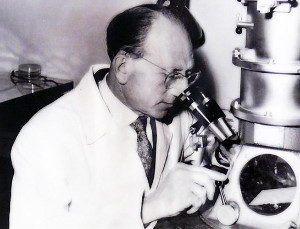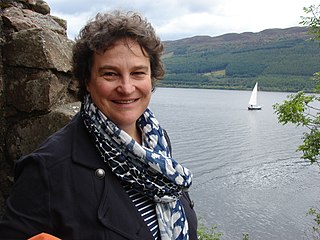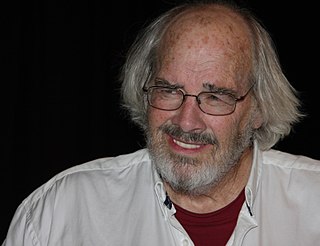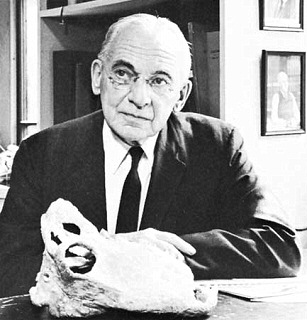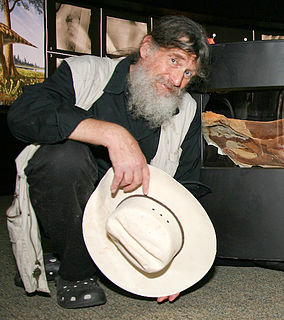Top 31 Paleontology Quotes & Sayings
Explore popular Paleontology quotes.
Last updated on November 30, 2024.
We still do not know the mechanics of evolution in spite of the over-confident claims in some quarters, nor are we likely to make further progress in this by the classical methods of paleontology or biology; and we shall certainly not advance matters by jumping up and down shrilling, `Darwin is god and I, So-and-so, am his prophet'
I didn't know how this would play out when I was a kid. I knew I wanted to play ball, be a paleontologist, and write poetry. I thought, 'Heck, where will I find the time? Well, football comes first, and I'll just find some time for poetry, and paleontology can come at the end.' I made this plan at 14, and dang, it's all coming together.
Biochemists and biologists who adhere blindly to the Darwinism theory search for results that will be in agreement with their theories and consequently orient their research in a given direction, whether it be in the field of ecology, ethology, sociology, demography (dynamics of populations), genetics (so-called evolutionary genetics), or paleontology. This intrusion of theories has unfortunate results: it deprives observations and experiments of their objectivity, makes them biased, and, moreover, creates false problems.
We know from astronomy that the universe had a beginning, from physics that the future is both open and unpredictable, from geology and paleontology that the whole of life has been a process of change and transformation. From biology we know that our tissues are not impenetrable reservoirs of vital magic, but a stunning matrix of complex wonders, ultimately explicable in terms of biochemistry and molecular biology. With such knowledge we can see, perhaps for the first time, why a Creator would have allowed our species to be fashioned by the process of evolution.
Read non-fiction. History, biology, entomology, mineralogy, paleontology. Get a bodyguard and do fieldwork. Find your inner fish. Don't publish too soon. Not before you have read Thomas Mann in any case. Learn by copying, sentence by sentence some of the masters. Copy Coetzee's or Sebald's sentences and see what happens to your story. Consider creative non-fiction if you want to stay in South Africa. It might be the way to go. Never neglect back and hamstring exercises, otherwise you won't be able to write your novel. One needs one's buttocks to think.
Perhaps generations of students of human evolution, including myself, have been flailing about in the dark; that our data base is too sparse, too slippery, for it to be able to mold our theories. Rather the theories are more statements about us and ideology than about the past. Paleontology reveals more about how humans view themselves than it does about how humans came about, but that is heresy.
The facts of paleontology seem to support creation and the flood rather than evolution. For instance, all the major groups of invertebrates appear "suddenly" in the first fossil ferrous strata (Cambrian) of the earth with their distinct specializations indicating that they were all created almost at the same time.
On the first page of the Bible there is an instance of how literalism is but an invitation to transcend the image to which literalism points. That first page is not geology, biology or paleontology; it is high religion. For there we are told who we are in terms of our constititutive text. And if we could understand that, we would worrying about whether the antelopes or the cantaloupes came in a certain order.
The more one studies paleontology, the more certain one becomes that evolution is based upon faith alone; exactly the same sort of faith which is necessary to have when one encounters the great mysteries of religion....The only alternative is the doctrine of special creation, which may be true, but irrational.
A large number of well-trained scientists outside of evolutionary biology and paleontology have unfortunately gotten the idea that the fossil record is far more Darwinian than it is. This probably comes from the oversimplification inevitable in secondary sources: low-level textbooks semipopular articles, and so on. Also, there is probably some wishful thinking involved. In the years after Darwin, his advocates hoped to find predictable progressions. In general. these have not been found-yet the optimism has died hard and some pure fantasy has crept into textbooks.
I have this amateur side attraction to, and interest in, the sciences and biology and physics and evolution. Paleontology is of interest to me. I'm interested in the way these fields have helped us understand how we are human and why we are human. I'm also from the area that is considered to be the cradle of mankind.
Paleontologists had long been aware of a seeming contradiction between Darwin's postulate of gradualism, confirmed by the work of population genetics, and the actual findings of paleontology. Following phyletic lines through time seemed to reveal only minimal gradual changes but no clear evidence for any change of a species into a different genus or for the gradual origin of an evolutionary novelty. Anything truly novel always seemed to appear quite abruptly in the fossil record.
The once rather old-fashioned science of paleontology finds itself in a maelstrom of excitement and controversy. Astrophysicists, atmospheric scientists, geochemists, geophysicists, and statisticians are all contributing to the extinction problem. And the general public is taking part through television talk shows, magazine cover stories, newspaper editorials, and even the occasional mention in gossip columns.






